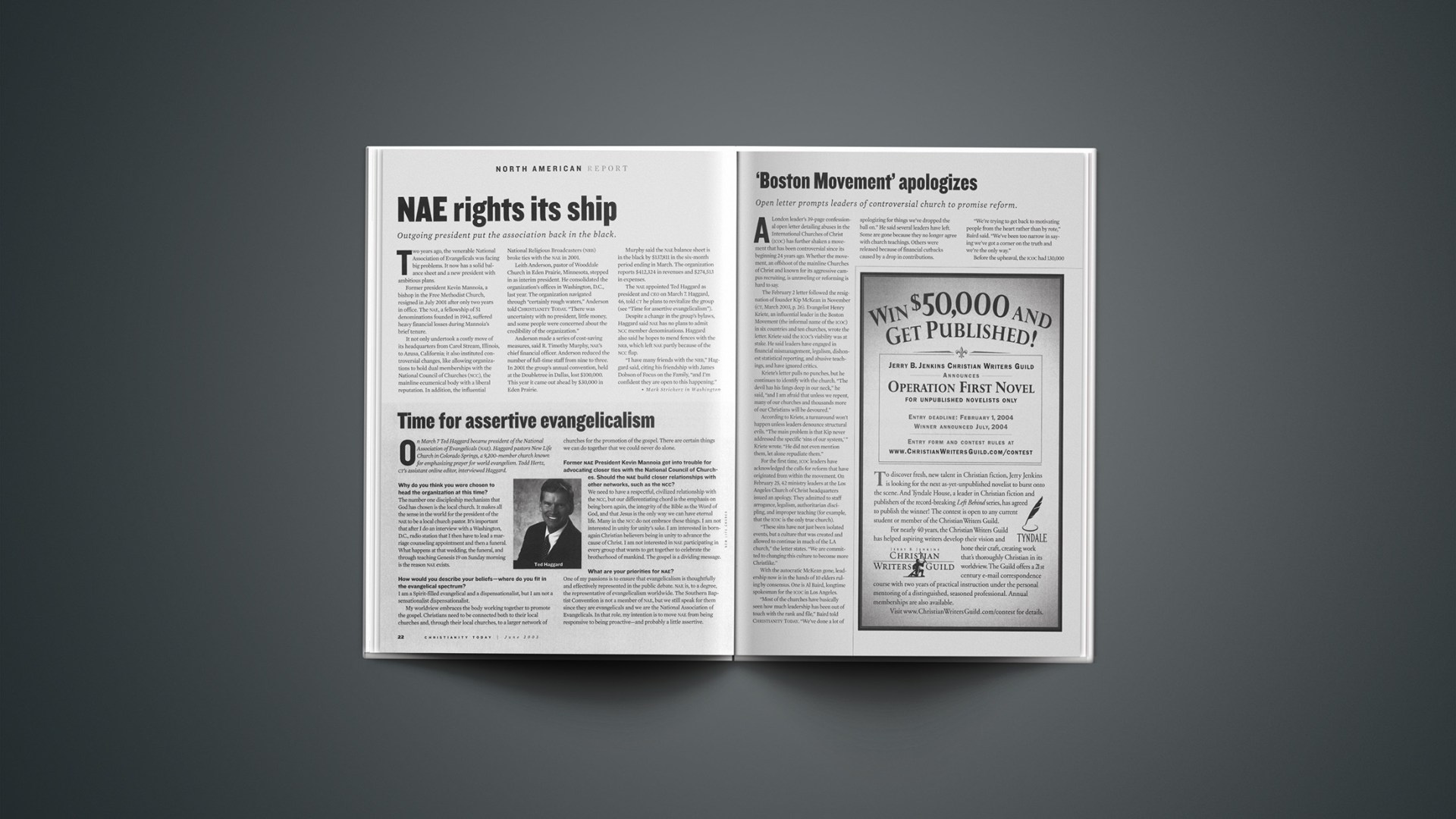A London leader’s 39-page confessional open letter detailing abuses in the International Churches of Christ (ICOC) has further shaken a movement that has been controversial since its beginning 24 years ago. Whether the movement, an offshoot of the mainline Churches of Christ and known for its aggressive campus recruiting, is unraveling or reforming is hard to say.
The February 2 letter followed the resignation of founder Kip McKean in November (CT, March 2003, p. 26). Evangelist Henry Kriete, an influential leader in the Boston Movement (the informal name of the ICOC) in six countries and ten churches, wrote the letter. Kriete said the ICOC’s viability was at stake. He said leaders have engaged in financial mismanagement, legalism, dishonest statistical reporting, and abusive teachings, and have ignored critics.
Kriete’s letter pulls no punches, but he continues to identify with the church. “The devil has his fangs deep in our neck,” he said, “and I am afraid that unless we repent, many of our churches and thousands more of our Christians will be devoured.”
According to Kriete, a turnaround won’t happen unless leaders denounce structural evils. “The main problem is that Kip never addressed the specific ‘sins of our system,’ ” Kriete wrote. “He did not even mention them, let alone repudiate them.”
For the first time, ICOC leaders have acknowledged the calls for reform that have originated from within the movement. On February 25, 42 ministry leaders at the Los Angeles Church of Christ headquarters issued an apology. They admitted to staff arrogance, legalism, authoritarian discipling, and improper teaching (for example, that the ICOC is the only true church).
“These sins have not just been isolated events, but a culture that was created and allowed to continue in much of the LA church,” the letter states. “We are committed to changing this culture to become more Christlike.”
With the autocratic McKean gone, leadership now is in the hands of 10 elders ruling by consensus. One is Al Baird, longtime spokesman for the ICOC in Los Angeles.
“Most of the churches have basically seen how much leadership has been out of touch with the rank and file,” Baird told Christianity Today. “We’ve done a lot of apologizing for things we’ve dropped the ball on.” He said several leaders have left. Some are gone because they no longer agree with church teachings. Others were released because of financial cutbacks caused by a drop in contributions.
“We’re trying to get back to motivating people from the heart rather than by rote,” Baird said. “We’ve been too narrow in saying we’ve got a corner on the truth and we’re the only way.”
Before the upheaval, the ICOC had 130,000 members worldwide, down from a claimed high of 185,000. More than 250,000 people have left the movement.
Jay Guinan, 41, and his wife, Deanna, illustrate some of the ICOC’s problems over the years. They joined the Rhode Island ICOC in 1994. Guinan, a small-business owner, said he had been a volunteer choir member and a children’s ministry worker. He persistently raised questions about what he believed were the lavish lifestyles of leaders and unbiblical financial demands put upon church members. A year ago, church leaders asked him to leave.
“Basically, I was told not to speak to anyone regarding financial issues of the church,” Guinan said. “People were told privately to stay away from us.”
Last June the Guinans started a small Bible study for former members of the ICOC. Bible study members gradually found local church fellowships with which they felt more comfortable. Guinan and his wife eventually joined an independent Protestant church in Attleboro, Massachusetts, where they live.
Guinan, however, has been forwarding news of recent developments, including Kriete’s letter, to interested parties. He said leaders in the Rhode Island church so far have shown a willingness to confess wrongdoings, but not an eagerness to repent.
Churches in at least a dozen large U.S. cities have issued online apologies. Some congregations have sponsored open forums in which members may express frustrations. Others, however, are ordering members not to read accounts on the Internet.
Moving on requires more than rhetoric, says Carol Giambalvo, who has conducted more than 60 interventions for families connected with ICOC. Her organization, the American Family Foundation in Naples, Florida, is a nonprofit research center and educational organization founded in 1979.
“I know people who will never attend a bona fide church again because they have been so bashed by this group,” she said.
Erol Dogan of Vancouver, British Columbia, is encouraged. Although he left the ICOC 12 years ago, Dogan said he has received five phone calls of apology from members of the church since the recent changes.
Ronald Enroth, author of Churches That Abuse, told CT it is extremely difficult for an aberrant Christian group with such an authoritarian structure to move into mainstream evangelicalism.
“It remains to be seen whether the International Churches of Christ, with its remaining power structure, can truly make major changes,” Enroth said. “If it does so, it won’t happen overnight.”
Copyright © 2003 Christianity Today. Click for reprint information.
Related Elsewhere
Previous Christianity Today articles on the International Churches of Christ include:
‘Boston Movement’ Founder Quits | Facing growth problems, controversial group changes leadership structure. (Feb. 26, 2003)
The Cost of Discipleship? | Despite allegations of abuse of authority, the International Churches of Christ expands rapidly. (Sept. 1, 1997)
Henry Kriete’s open letter is available online.
The official website of The International Churches of Christ has posted responses to Kriete’s letter. The site also has Kip McKean’s resignation letter and a responses from elders.
Rightcyberup.org, a site dedicated to recovery from the ICoC, has posted an article on the current situation.
In the late 1970s, Timothy and Carla Williams saw the early beginnings of what would become the Boston Movement. Their book examining the problems of the ICoC, Bewitchment: You Foolish Galatians, is available at Christianbook.com.
The Watchman Expositor online site has a profile of International Churches of Christ.










